Jennifer Hall-Lande, University of Minnesota, Institute on Community Integration and MN-LEND (Leadership Education in Neurodevelopmental Disabilities)
Deana McGuire Buck, Richmond, Virginia
Deepa Srinivasavaradan, SPAN Parent Advocacy Network, Newark, New Jersey
Karen H. Brown, University of the Virgin Islands
Gail S. Chödrön, Waisman Center, University of Wisconsin-Madison
Stephanie Weber, University of Cincinnati College of Medicine and Cincinnati Children’s Hospital Medical Center, Cincinnati, Ohio
Abstract
Early identification of developmental delays in young children is a national priority. Yet, a significant number of children do not receive timely developmental monitoring and screening as part of current health and early identification systems. The Centers for Disease Control and Prevention’s (CDC’s) “Learn the Signs. Act Early.” (LTSAE) program addresses these challenges through an innovative network of Act Early ambassadors working in their states/territories to improve early identification systems. Ambassadors engage families and transform systems to support family-engaged developmental monitoring, healthy child development, and early identification efforts. This article shares how five ambassadors use LTSAE resources to empower families and improve early identification in their communities.
Early identification of developmental delays in young children is a national priority. The significant benefits of early identification are well documented. The earlier intervention occurs in the lives of children with developmental delays, the better their educational and life outcomes (Dawson, 2016). The early childhood years are a critical time for brain development, an optimal time to intervene and provide support if there are developmental delays. Early identification of developmental delays has the power to enhance long-term child and family outcomes and change the trajectory of a child’s development (Bradshaw et al., 2015).
Developmental delays are remarkably common in young children. Approximately 1 in 6 children are at risk for a developmental delay (Cogswell et al., 2022; Zablotsky et al., 2019). Other estimates reveal that approximately 10–15% of preschool children have a developmental delay (Choo et al., 2019). Not all young children (birth to 5 years old) in need of services and supports are identified early and connected to early intervention services.
Family engagement is a key ingredient in the early identification process. Families are their child’s first teachers and are well-positioned to naturally observe the progression their child makes through various developmental milestones. As children grow, monitoring of developmental milestones can be a great tool for families to celebrate and support the achievement of milestones, as well as understand the concerns if progress toward achieving milestones is delayed or unmet. Having access to information helps families to celebrate their child’s development, support inclusion, and set high expectations, so they can reach their fullest potential, whatever that may look like for each child.
Typically, families know their children the best. Further, research has shown they are often the first people in a child’s life to notice a delay and that parent-reported developmental concerns are a strong predictor of later developmental delay or disability (Sacrey et al., 2015). Yet, many delays in development often go unrecognized because the early identification process can be challenging for families. While parents and caregivers have a good sense of their child’s individual progress, they may not be aware of what is developmentally expected at their child’s age, or they may miss subtle signs of early delays. When families do notice developmental concerns, they may not always know where to turn for support. Further, the process of accessing early intervention services is complex. All of these factors contribute to delayed or missed identification of developmental delays. Thus, a critical need exists to increase access to early identification and support families in navigating this process.
The “Learn the Signs. Act Early.” Program
To address these early identification needs and reduce barriers to family access, the Centers for Disease Control and Prevention (CDC) developed the “Learn the Signs. Act Early.” (LTSAE) program, a public health education and outreach program which aims to educate families, communities, and systems on healthy child development and highlight the importance of parent/caregiver engaged developmental monitoring, screening, and early identification of developmental delays. This program provides a wealth of free, family-friendly evidence-based resources to support developmental monitoring.
LTSAE materials help families dually celebrate the achievement of developmental milestones and increase family engagement to support the early identification of developmental delays. LTSAE resources are designed for both families and professionals and are accessible in many formats, including printed books/brochures, online videos, checklists, and a mobile Milestone Tracker app (CDC, 2021) for monitoring and celebrating developmental milestones. LTSAE materials can be easily accessed online at www.cdc.gov/ncbddd/actearly/index. html. Further, LTSAE materials can be customized to meet community and program needs, which promotes community engagement and cultural responsiveness. The CDC also encourages cultural and linguistic adaptation of LTSAE materials to meet family and community needs. Some examples of customization are: listing state or local resources/contacts on print materials, translating materials, creating supplementary materials, and customizing with photos from the community.
LTSAE promotes family engagement and provides tools for positive, ongoing family–professional conversations and collaborations to support child development. Evaluation studies have found that parents have positive perceptions of LTSAE. LTSAE materials increased parent knowledge of developmental milestones and increased the likelihood of following up with a professional when there was a developmental concern (Graybill et al., 2016). In a study of LTSAE use in Early Head Start, 51% of parents reported that using LTSAE helped them identify a developmental concern about their young child (Abercrombie et al., 2021).
Act Early Ambassador Program
An innovative approach to engage families and systems around LTSAE has been the “Act Early Ambassador” program, in which early childhood community leaders are selected to serve as Act Early ambassadors. Due to the early success of the Act Early Ambassador program, CDC recognized the need to expand the reach and use of LTSAE resources in states/territories across the US. To facilitate that work, the CDC piloted a program in 2011 to identify a small group of Act Early ambassadors to serve as the state point-of-contact for the national LTSAE program and to support the integration of the resources in existing health and early childhood systems. Based on the positive pilot results, the CDC expanded the reach of ambassadors to every state, the District of Columbia, and three territories. The model has been replicated by other organizations serving young children and families, including the Recommended Practices (aRPy) Ambassador Initiative (https://ectacenter.org/decrp/arpy_ambassadors.asp) which is a collaborative effort by the Early Childhood Technical Assistance Center, Division for Early Childhood Council for Exceptional Children, and Parent Center Network. To locate the CDC Act Early ambassador in your state, visit (https://www.cdc.gov/ncbddd/actearly/ambassadors-list.html).
Act Early ambassadors serve as a bridge between CDC’s LTSAE program and the states/territories they serve. They come from a variety of disciplines that serve young children and families including pediatrics, public health, psychology, education, speech/language pathology, family advocates/ leaders, and other related fields. Many Act Early ambassadors have lived experience as parents or family members of children with developmental delays who benefited from early identification and intervention services. Ambassadors are skilled at relationship building and bring both professional knowledge and lived experiences to their work. They have strong relationships with systems serving young children in their communities and leverage opportunities for integrating LTSAE resources into state early childhood and health systems.
Ambassadors work to transform early identification systems to empower families and increase access to early identification. Ambassadors develop key partnerships across organizations and settings to promote LTSAE materials and messages in creative ways in their communities. Over the years, ambassadors have partnered with early childhood education, health care, nutrition, university projects, and family support and advocacy systems. Some examples include Head Start/Early Head Start, Special Supplemental Nutrition Program for Women, Infants, and Children (WIC), Individuals With Disabilities in Education Act, Part C/Part B 619, Child Care and Development Block Grant, Preschool Development Grant, Help Me Grow (HMG), Title V Maternal and Child Health, Home Visiting, health care providers, Leadership Education in Neurodevelopmental Disabilities programs, Autism and Developmental Disabilities Monitoring network projects, and higher education.
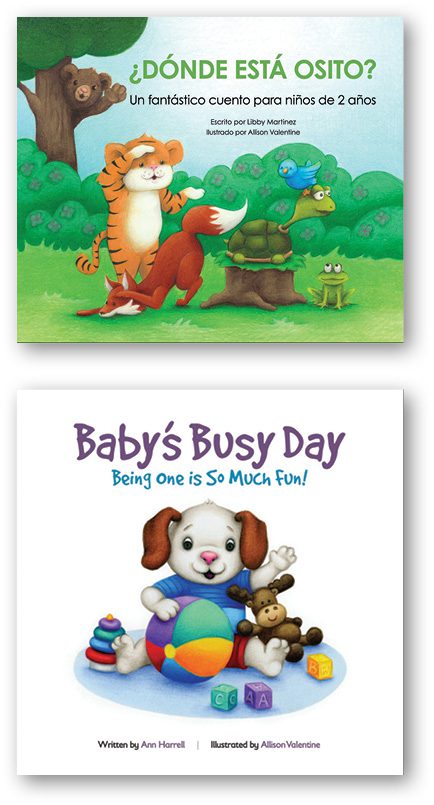
“Learn the Signs. Act Early.” resources are designed for both families and professionals and are accessible in many formats, including printed books and brochures.
Act Early ambassadors work to empower families and transform systems to support healthy child development and promote early identification. While a broad goal is to integrate LTSAE into key early childhood systems to increase early identification, an equally important goal is to empower families to celebrate developmental milestones and regularly monitor their child’s development. Ambassadors have helped to customize LTSAE materials to meet the needs of local communities and families. For example, the ambassador in Minnesota partnered with local communities to translate LTSAE materials into a variety of local languages (e.g., Somali, Hmong) and customize materials with photos from the local community. The ambassador in Alaska worked with partners to develop a customized version of the children’s books to better reflect the lived experience of families of young children in Alaska.
Ambassadors also played a key role in supporting families and responding to communities during the ongoing COVID-19 pandemic. In the early days of the pandemic, services were limited, eliminated, or modified using technology, and there was a decrease in children participating in well-child visits. Far fewer children under 5 years old were subsequently referred for early intervention services across early childhood systems. To address these challenges, grants to expand the work of Act Early ambassadors were awarded to improve early identification and lessen the negative impact of COVID-19 on the identification of developmental delays and disabilities, particularly among children in medically underserved populations.
Ambassadors working along with state teams of early childhood stakeholders were charged with developing strategies to meet states’ needs to promote early identification and support the resilience of children, families, and communities. Resourceful methods were developed to reach families and strengthen communities, given the ongoing impact of COVID-19. To date, close to 1,000 events reaching more than 100,000 people have been offered through these projects, including online trainings/webinars, workshops or conferences, and health fairs. In addition, the free materials have been a popular tool to promote LTSAE awareness and over 160,000 pieces have been distributed to families and professionals, including early childhood education settings and pediatric health care practices. Act Early teams also used technology in innovative ways, including social media, virtual webinars, website content, and radio advertisements.
These projects have had more than 2 million impressions and continue to offer caregivers real-time information, access to the LTSAE materials, and opportunities to learn about ongoing support available in their state and across the country. Through this work, the use of the Milestone Tracker App has exponentially increased as well. Prior to the pandemic, there were approximately 725,000 launches of the app nationally. In 2020 and 2021, there were over 1.4 million and 1.2 million launches, respectively. The app is one way to empower families to actively engage in the developmental monitoring process for their children and one of the materials promoted most often by Act Early ambassadors.
Finally, ambassadors have created a robust national network of early childhood leaders working in concert to transform early identification systems to promote increased access and equity for young children and families. Ambassadors meet regularly and share innovative approaches in their states/territories which, in turn, other ambassadors are able to implement in their states at a systems level. Ambassadors collaborate on interstate projects and conferences, and they share materials and resources. On both national and state levels, the ambassador program has elevated the work and improved early identification for systems and families.
Engaging Families in Early Identification
The work of the Act Early ambassadors across the country is broad and the strategies used to promote early identification are diverse. The following sections highlight how ambassadors in four U.S. states and one territory are engaging parents and families in their communities around LTSAE. Each profile highlights different ways ambassadors have customized their outreach to meet the unique needs of families and improve early childhood systems in their states and communities.
Minnesota
The focus of the Act Early work in Minnesota (MN) has been on building community partnerships and systems capacity to engage families. In MN, there was a need for collaborative partnerships with communities to focus on the importance of early identification while accommodating cultural views of child development. The MN Act Early Project led by the MN ambassador focused on promoting early identification by using a parent-to-parent connection model within local communities. Underlying this model is the belief that parents and families have the knowledge of the best ways to connect with other families in their community. This project partners with parent leaders within culturally and linguistically diverse communities to serve as “parent connectors” to share LTSAE and early identification resources in their communities. Connectors participate in a series of ongoing trainings on child development, early identification of developmental delays, and general LTSAE messaging and resources. Help Me Grow Minnesota (HMG MN) is a key systems partner that contributes valuable collaboration and training resources on accessing the early intervention referral system.
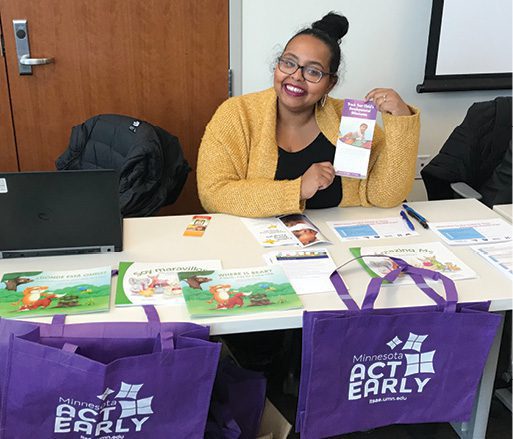
The focus of the Act Early work in Minnesota has been on building community partnerships and systems capacity around engagement of families.
MN parent connectors create opportunities to discuss the importance of early identification through a cultural lens. LTSAE materials are integrated into community-based settings such as cultural organizations, culturally focused early childhood education settings, neighborhood clinics, community centers, faith-based communities, and early childhood programs that serve diverse families. Connectors have developed LTSAE public service announcements in their native languages. Social media and media outreach (e.g., podcasts, culturally focused radio programs, bumper ads, community newspapers) have further extended LTSAE outreach in communities. Connectors have built strong connections with families and have reached many families who have typically not had access to information through more traditional communications approaches. To date, direct connections have been made with thousands of families in MN communities. Further, these trusted community relationships have provided input into building a more culturally responsive early identification system in MN. Box 1 features a quote from a MN parent connector about her experience sharing LTSAE materials and resources in the community.
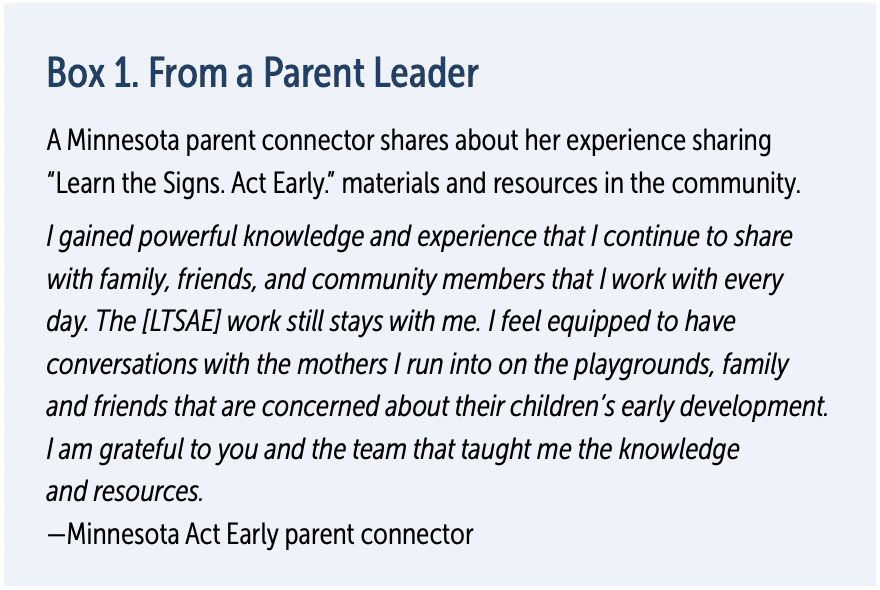
New Jersey
On a state systems level, the MN ambassador has worked to integrate LTSAE into numerous early childhood systems including HMG MN, Head Start, county public health, home visiting, early intervention (Part C/B), MN state agencies, university training programs, MN Early Childhood Comprehensive Systems (ECCS) project, MN public television, and numerous family-focused organizations. Large urban school districts disseminate LTSAE children’s books at their “Screen at Three” programs reaching thousands of new families. MN Act Early social media campaigns have reached thousands of parents and early childhood education providers. The MN ambassador and Center for Early Education and Development developed a Family Resiliency podcast telling family stories of resilience during and after the pandemic. A collaborative MN Act Early webinar series was developed with community partners to support families of young children. Partnerships with university-based projects such as Minnesota’s Leadership Education in Neurodevelopmental Disabilities and MN Autism and Developmental Disabilities Monitoring network (commonly known as the ADDM network) have also expanded LTSAE reach. The MN Act Early Project lays the foundation for empowering families, engaging communities, and increasing systems capacity to support healthy development for all MN children.
The Act Early ambassador to New Jersey (NJ) is a parent of a child with special needs and works at SPAN Parent Advocacy Network (SPAN), a family organization that serves as a one-stop for families in NJ. The ambassador leads multiple projects including the Act Early COVID-19 Response Project and also serves as the state parent lead for early childhood initiatives. These roles have strengthened the state team and enhanced NJ’s focus on improving early childhood and family engagement outcomes. LTSAE materials are disseminated by all SPAN projects. The NJ ambassador has collaborated with several partners including NJ’s HMG and ECCS P-3 initiatives to develop and sustain a cadre of LTSAE parent champions from diverse personal and professional backgrounds. They use the parent-to-parent model to support families and through developmental health promotion activities in their communities. See a NJ parent champion quote in Box 2 about her experience sharing LTSAE materials in the community.
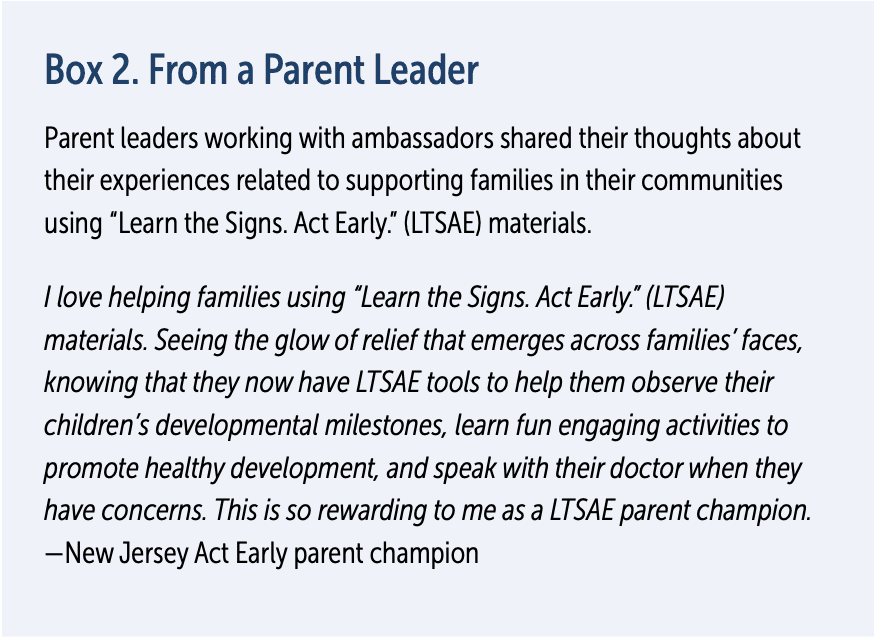
In addition, policies and protocols for NJ’s HMG, ECCS P-3, and Home Visiting programs highlight LTSAE materials as key resources to share with families. In collaboration with these initiatives, the ambassador also developed the Child Developmental Passport, a tool to empower families to record their child’s developmental screening information along with the well-child visit information at the recommended ages from birth to 5 years old. The tool is a conversation starter for families and helps them share information with their child’s providers. CDC has recognized NJ’s Child Developmental Passport as a valuable tool and has integrated it into their recently updated Milestone Moments booklet.

The New Jersey ambassador collaborates with and provides presentations to programs and organizations across the state to share “Learn the Signs. Act Early.” and emphasize the importance of engaging and supporting families to be involved in their own child’s development.
The NJ ambassador collaborates with and provides presentations to programs and organizations across the state to share LTSAE and emphasize the importance of engaging and supporting families to be involved in their own child’s development. The partnerships with state departments and other partners have been instrumental in reaching statewide networks of Family Success Centers, Federally Qualified Health Centers, County Councils for Young Children, Community Health Workers Training Institute, Reach Out and Read program, Child Care Resource and Referral Agencies, and other groups to train professional and parent champions to provide information and ongoing support to families with young children. In addition, SPAN’s #MilestoneMonday social media campaign helps reach a broader audience with messages supporting LTSAE, resilience-building, and other related topics.
Ohio
Ohio is a state rich with resources in many areas, including five large children’s hospitals, yet resources are sparse in many rural and Appalachian areas. The goals of Act Early Ohio are as diverse as the geography of the state. One main goal is to reach families of young children by collaborating with other families and parents of young children. Specifically, social media influencers, similar to brand ambassadors for athletic wear, were recruited to use personal social media channels (e.g., Facebook, Instagram) to share their use of the CDC Milestone Tracker app, the children’s books, and other materials. These influencers doubled the amount of app launches in Ohio. Their content has included images and videos of storybook reading of Act Early program books as well as thematic Saturday story time related to events occurring in Ohio, such as the opening series of Major League Baseball between the two Ohio teams, the Cincinnati Reds and Cleveland Guardians. Act Early Ohio’s most popular videos included swim safety tips in the summer and readings of the LTSAE books by Santa in the winter. Resiliency- focused posts have promoted community baby showers, fatherhood initiatives, and Dolly Parton’s Imagination Library (https://imaginationlibrary.com) to promote parent–child connectedness and early literacy.
Act Early Ohio team members also include promotoras de salud, or community health workers in Latino communities. These mothers have credibility in their communities and through their experience of raising a child with a developmental concern. They share the materials with other parents through community health fairs or through agencies and systems that interface with Spanish-speaking Ohioans. Their networks have fostered new state collaborations, including the Ohio Coalition on Hispanic/Latino Affairs who have partnered with Act Early Ohio to disseminate information directly from their social media channels and newsletters.
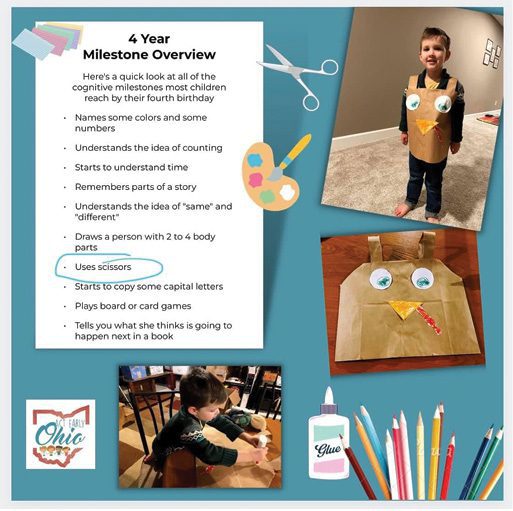
Act Early Ohio also assembles “physician toolkits” which are pre-made bags of all the essential “Learn the Signs. Act Early.” materials, so it is easy for health professionals to share with caregivers and also engage in conversation about the child’s development.
State and national data show that health professionals also need more information to ensure families are engaged in the developmental monitoring process. To that extent, Act Early Ohio also assembles “physician toolkits” which are pre-made bags of all the essential LTSAE materials, so it is easy for health professionals to share them with caregivers and also engage in conversation about the child’s development. Families receive a children’s book for their child’s age as well as information about the LTSAE program, and physicians and health professionals have a tangible reminder of the importance of talking about development. Our team has reached more than 35 practices in more than one third of Ohio counties with over 1,750 toolkits distributed. Providers say they love having the materials ready to share with their patients’ families. Act Early Ohio is one piece of the COVID-19 recovery in Ohio. The program aims to assist in getting children the necessary services and supports, and Ohio has seen an improvement in referral to and enrollment in early intervention since the early days of the pandemic.
US Virgin Islands
Promoting developmental monitoring using LTSAE in the US Virgin Islands (USVI) has been a collaborative practice between the Act Early Ambassador and agencies charged with providing services to young children and their families. One example includes promoting developmental monitoring to fathers of children enrolled in the Head Start program during a father engagement day. The CDC’s Act Early ambassador to the USVI worked directly with fathers to encourage them to monitor their children’s development, using the LTSAE Amazing Me—It’s Busy Being 3! children’s book. This activity is one of the Head Start program’s engagement efforts to support fathers and male caregivers in monitoring the early development of their children, held during an annual Father and Child Activity Day.
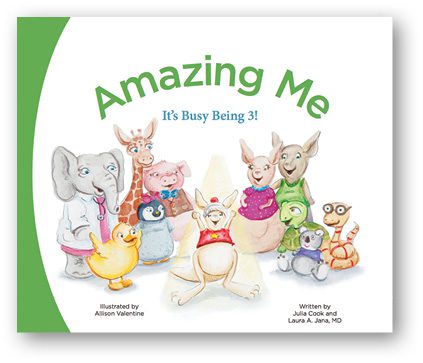
The Act Early ambassador to the US Virgin Islands worked directly with fathers to encourage them to monitor their children’s development, using the Amazing Me—It’s Busy Being 3! children’s book.
The USVI Act Early ambassador read the book and illustrated a fun, interactive way of learning about children’s development at 3 years old across developmental domains. At the bottom of select pages, the author highlights developmental milestones, called Milestone Moments. The end of the story includes a checklist of developmental milestones for 3 year olds, parenting tips to assist children to learn and grow, and examples of concerns that should be discussed with the child’s doctor.
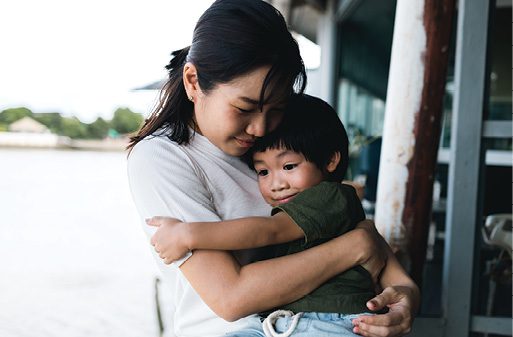
The Center for Family Involvement also uses the expertise of cultural brokers to support families of children with disabilities in Virginia, particularly immigrant, refugee, and/or racially/ethnically diverse populations.
The USVI ambassador’s interactive presentation involved reading the book out loud as fathers followed along with their 3- and 4-year-old children. Each family was given a copy of the book to take home. As the ambassador read with the fathers and their children, she engaged the children in skills that are typical of their age group. Reading an LTSAE children’s book can help caregivers learn about developmental expectations for their young children, the importance of developmental monitoring, how to monitor developmental milestones in an engaging way, and what to do when they identify a concern (i.e., follow up with their child’s doctor and early intervention specialists).
Virginia
In Virginia (VA), the Act Early ambassador’s work has focused on engaging with families through existing family support efforts. The Parent Educational Advocacy and Training Center (PEATC) is Virginia’s Parent Training and Information center and has a strategic focus on early identification and support for families of young children. Content about developmental milestones has been included on PEATC’s social media channels. These topics have also been included in the Early Childhood Academy (an online course for families of young children with delays/disabilities), Facebook Live sessions for families, and in the Ready or Not, Here They Grow! workshop on childhood development. PEATC also supported the printing of LTSAE books that are being shared with families across the commonwealth.
The VA ambassador has also collaborated with New Path, a family support initiative funded by Virginia’s Part C office and administered by the Arc of Virginia. New Path offers support and information to families served through early intervention and also connects with families who may have concerns about their child’s development. LTSAE materials are included in resource packets for families of children in neonatal intensive care units in Virginia and have also been highlighted in Facebook Live sessions offered by New Path.
The Act Early ambassador has also worked closely with the Center for Family Involvement (CFI), Virginia’s Family to Family Health Information Center, to support families of young children. Leaders from CFI also serve on VA’s Act Early Team and co-lead the COVID-19 Response Team project to improve early identification. The CFI team is made up of veteran parents from across VA. They have the opportunity to share information with families and help them with navigating local systems to secure services their children need. The CFI team also offers one-on-one support to families, a vital resource in navigating complex systems, and have shared LTSAE resources at community events across VA.
CFI also uses the expertise of cultural brokers to support families of children with disabilities in VA, particularly immigrant, refugee, and/or racially/ethnically diverse populations. The CFI team is now conducting research to learn more about the use of cultural brokers to build resilience in culturally diverse families who are new to navigating systems for their children. CFI has a robust social media presence and content about early identification, developmental milestones, and how to take action when concerns are identified. VA’s Act Early Team has also prioritized an expanded social media presence to share LTSAE resources. A needs assessment was conducted to identify the existing social media infrastructure of partner agencies and those connections have been used to disseminate relevant content directly to families.
Conclusion
Complex challenges in the field of early childhood require innovative solutions. Early identification of developmental delays in young children is a significant national priority. Yet, a considerable number of children lack access to developmental screening and follow-up and are missed within the current early identification system, resulting in a systems-level missed opportunity to improve the lives of young children and families. CDC’s “Learn the Signs. Act Early.” program works to address these challenges through a network of Act Early ambassadors working in their states and local communities. Act Early ambassadors lead projects and use various strategies to empower families and transform systems to promote healthy child development and early identification. While the examples in this article demonstrated how five Act Early ambassadors have used LTSAE materials in their states/territory, it is important to note that these materials are freely available for use by anyone involved with young children. Early childhood professionals, pediatric health care practices, or anyone involved in providing services to and supporting families with young children, including family members, can also use LTSAE materials to engage families and promote early identification. Visit (www.cdc.gov/ncbddd/actearly/resources.html) to explore LTSAE resources!
Learn More
There are many resources on the “Learn the Signs. Act Early.” (LTSAE) website (https://www.cdc.gov/ncbddd/actearly/index.html) that can be used by family members/caregivers, health care professionals, early childhood professionals, and those interested in early child development.
The Centers for Disease Control and Prevention developed the LTSAE program as a public health education and outreach program which aims to educate families, communities, and systems on healthy child development and highlight the importance of parent/caregiver engaged developmental monitoring, screening, and early identification of developmental delays/disabilities. This program provides a wealth of free, family-friendly evidence-based resources to support developmental monitoring. On the page, there are specific sections for various audiences. Find the information for families here: www.cdc.gov/ncbddd/actearly/parents/index.html
LTSAE Digital Toolkit provides links to key LTSAE family-friendly resources: https://app.box.com/s/9vy1ymonj4yo9oqhk0jyowfenufn1htg
CDC’s Milestone Tracker App
Milestones matter! Track your child’s milestones from age 2 months to 5 years with CDC’s easy-to-use illustrated checklists, get tips from CDC for encouraging your child’s development, and find out what to do if you are ever concerned about how your child is developing. It is available in English or Spanish and corrects for prematurity. Start tracking milestones today! www.cdc.gov/ncbddd/actearly/milestones-app.html
For caregivers who have concerns about a child’s development, there are talking points, tip sheets, and links to early intervention resources in each state on the following page: www.cdc.gov/ncbddd/actearly/concerned.html. Information on developmental screening and evaluation is also included here.
Obtain your own copies of “Learn the Signs. Act Early.” materials! Limited quantities of LTSAE materials are available for order and shipment at no cost through CDC’s site: www.cdc.gov/ncbddd/actearly/freematerials.html#customizematerials
Author’s Note
The findings and conclusions in this report are those of the authors and do not necessarily represent the official position of the Centers for Disease Control and Prevention. Correspondence regarding this article should be addressed to Jennifer Hall-Lande, at hall0440@umn.edu
Author Bios
Jennifer Hall-Lande, PhD, LP, is a researcher and psychologist in the field of early intervention at the Institute on Community Integration (ICI) at the University of Minnesota. Dr. Hall-Lande is also faculty on Minnesota’s Leadership Education in Neurodevelopmental Disabilities (MN LEND; lend.umn.edu) program. Dr. Hall-Lande has an extensive background working with young children and families in clinical, school, and early childhood settings including preschools and early childhood education centers. Her clinical work focuses on child development, including early identification of autism and other developmental disabilities and delays. Dr. Hall-Lande leads multiple research and outreach projects at UMN including the MN Autism Developmental Disabilities Monitoring (ADDM; addm.umn.edu) project and several other research projects focusing on early identification of developmental delays and disabilities. Dr. Hall-Lande has served as the Centers for Disease Control and Prevention’s Act Early ambassador to Minnesota since 2016. Through her Act Early work, she has built many strong and sustained professional partnerships and valuable community connections within state systems, communities, and families in Minnesota.
Deana McGuire Buck, MEd, is an early childhood consultant in the field of early intervention/early childhood and has worked in the field of early childhood development in Virginia for 36 years. She is now serving in her fifth term as the Centers for Disease Control and Prevention’s Act Early ambassador to Virginia, having played this role since 2012. She also co-leads Virginia’s COVID-19 Response Team project and Act Early Team. Ms. Buck retired from the Partnership for People with Disabilities, Virginia’s University Center for Excellence in Developmental Disabilities, at Virginia Commonwealth University in 2020 after 28 years of service. At the Partnership, she served as assistant director, early childhood/early intervention team leader, training director, and principal investigator for statewide initiatives funded to improve services for young children with disabilities and their families through quality professional development, research, and systems change. Through her work in early childhood systems in Virginia, Ms. Buck established and maintained a strong cross-sector network of colleagues who administer early childhood systems, including early childhood education, early intervention, and home visiting. She holds an undergraduate degree in speech pathology and audiology from Longwood College and a master’s degree in education from the University of Virginia.
Deepa Srinivasavaradan, IMH-E®, is the director of Early Childhood Initiatives at SPAN Parent Advocacy Network in New Jersey (NJ). She is also the Centers for Disease Control and Prevention’s “Learn the Signs. Act Early.” ambassador, the Division for Early Childhood Recommended Practices program ambassador, and the state parent lead for New Jersey’s Early Childhood Initiatives—Help Me Grow, Early Childhood Comprehensive Systems Prenatal-to-Three, and Home Visiting. Ms. Srinivasavaradan is deeply passionate about improving early childhood and family engagement outcomes and also serves on several state and national advisory groups and workgroups. She is committed to helping individuals with disabilities and their families to navigate systems of care, enhancing family-professional partnerships, and supporting parent leadership development, to ensure that families are equal partners at all levels because of her own experiences as an immigrant mother. Ms. Srinivasavaradan is NJ’s Association for Maternal and Child Health Programs (AMCHP) family delegate and the NJ Leadership Education in neurodevelopmental and Related Disorders (NJLEND) family fellow. She is also the recipient of the 2020 Merle McPherson Award for her exemplary contributions to further family–professional collaborations within state Title V programs and AMCHP. In collaboration with her state team, Ms. Srinivasavaradan has also helped create several NJ-specific resources to address gaps in connecting to services when developmental concerns are identified in young children.
Karen H. Brown, PhD, MPH, CCC-SLP, is dean of the School of Education and associate professor at the University of the Virgin Islands (UVI). She holds a doctorate in curriculum and instruction with a concentration in special education, a master of science degree in speech-language pathology, and a master of public health with a concentration in social and behavioral sciences. She is a licensed speech-language pathologist with 30 years of experience and maintains the Certificate of Clinical Competence by the American Speech-Language-Hearing Association. Dr. Brown has served as the Centers for Disease Control and Prevention’s (CDCs) Act Early ambassador to the US Virgin Islands (USVI) since 2016, where she mobilizes stakeholders in monitoring young children’s development and guiding next steps for early identification and intervention of children with and at risk for developmental delays and disabilities. She was recently named a Recommended Practices (aRPy) ambassador for the Division for Early Childhood of the Council for Exceptional Children. ambassador of the Division for Early Childhood of the Council for Exceptional Children.
Gail S. Chödrön, PhD, is a scientist at the Waisman Center University Center for Excellence in Developmental Disabilities (UCEDD) and Public Health Program Faculty in the School of Medicine and Public Health at the University of Wisconsin-Madison. At the Waisman Center, she serves as training director for the Wisconsin Leadership Education in Neurodevelopmental and Related Disabilities (WI LEND) program and UCEDD lead for community training and technical assistance efforts. Dr. Chödrön’s training, outreach, and research interests focus on early identification, health equity, and community-engaged research and change efforts. She served as the Centers for Disease Control and Prevention’s (CDC’s) Act Early ambassador to Wisconsin from the first cohort of ambassadors in 2011 to 2019 and is the team lead for the state’s Act Early State Team. Dr. Chödrön has completed studies of the acceptability, feasibility, and effectiveness of integrating developmental monitoring using “Learn the Signs. Act Early.” into early childhood education and Early Head Start settings. She is currently the project director for the Wisconsin Care Integration Initiative and partners with a community leader to co-direct a Community of Solutions Health Equity project funded by the Robert Wood Johnson Foundation.
Stephanie Weber, PsyD, MPH, is an assistant professor in the Department of Pediatrics at the University of Cincinnati and works in the Division of Developmental and Behavioral Pediatrics at Cincinnati Children’s Hospital Medical Center (CCHMC). She obtained her doctor of psychology degree from the University of Indianapolis and her master’s in public health degree from University of Cincinnati. Dr. Weber completed fellowship at CCHMC in 2013 and has since been the training director of the Maternal and Child Health Bureau-funded Leadership Education in Neurodevelopmental and Related Disabilities program and the University Center for Excellence in Developmental Disabilities. She is a founding member of Project SCOPE: Supporting Children of the Opioid Epidemic, a federally funded National Training Initiative to promote education to interdisciplinary audiences on emerging best practices to promote development in children exposed to opioids and/or environmental trauma. Dr. Weber also serves as Ohio’s Act Early ambassador for the Center for Disease Control and Prevention’s “Learn the Signs. Act Early.” public health initiative and the chairperson for the Next Step Collaborative, a coalition in the Greater Cincinnati area to promote education, research, and advocacy to support families impacted by substance use disorders.
Suggested Citation
Hall-Lande, J., Buck, D. M., Srinivasavaradan, D., Brown, K. H., Chödrön, G. S., & Weber, S. (2022). Promoting family engagment and early identification of developmental delays: The role of Act Early ambassadors. ZERO TO THREE Journal, 43(1), 28–37.
References
Abercrombie, J., Pann, J., Shin, F., Taylor, E., Brisendine, A. E., Swanson-Holm, R., James, C., Viehweg, S., & Chödrön, G. (2021). Evaluation of the feasibility and perceived value of integrating Learn the Signs. Act Early. developmental monitoring resources in Early Head Start. Early Childhood Education Journal, 1–13. https://doi.org/10.1007/s10643-021-01247-5. https://link.springer.com/article/10.1007/s10643-021-01247-5
Bradshaw, J., Steiner, A. M., Gengoux, G., & Koegel, L. K. (2015). Feasibility and effectiveness of very early intervention for infants at-risk for autism spectrum disorder: A systematic review. Journal of Autism and Developmental Disorders, 45(3), 778–794. doi: 10.1007/s10803-014-2235-2. https://link.springer.com/article/10.1007/s10803-014-2235-2
Centers for Disease Control and Prevention. (2021). CDC’s milestone tracker app. https://www.cdc.gov/ncbddd/actearly/milestones-app.html
Choo, Y. Y., Agarwal, P., How, C. H., & Yeleswarapu, S. P. (2019). Developmental delay: Identification and management at primary care level. Singapore Medical Journal, 60(3), 119–123. https://doi.org/10.11622/smedj.2019025. www.smj.org.sg/article/developmental-delay-identification-and-management-primary-care-level
Cogswell, M. E., Coil, E., Tian, L. H., Tinker, S. C., Ryerson, A. B., Maenner, M. J., Rice, C. E., & Peacock, G. (2022). Health needs and use of services among children with developmental disabilities—United States, 2014–2018. Morbidity and Mortality Weekly Report, 71(12), 453–458. http://dx.doi.org/10.15585/mmwr.mm7112a3. www.cdc.gov/mmwr/volumes/71/wr/mm7112a3.htm?s_cid=mm7112a3_w
Dawson, G. (2016). Why it’s important to continue universal autism screening while research fully examines its impact. JAMA Pediatrics, 170(6), 527–528.
Early Childhood Technical Assistance (ECTA) Center. (2017). Part C Infant and Toddler Program federal appropriations and National Child Count 1987–2016. http://ectacenter.org/partc/partcdata.asp
Graybill, E., Self-Brown, S., Lai, B., Vinoski, E., McGill, T., & Crimmins, D. (2016). Addressing disparities in parent education: Examining the effects of Learn the Signs/Act Early parent education materials on parent outcomes. Early Childhood Education Journal, 44(1), 31–38. https://doi.org/10.1007/s10643-014-0680-3. https://link.springer.com/article/10.1007/s10643-014-0680-3
Sacrey, L., Bennett, J., & Zwaigenbaum, L. (2015). Early infant development and intervention for autism spectrum disorder. Journal of Child Neurology, 30(14), 1921–1929. doi: 10.1177/0883073815601500. https://journals.sagepub.com/doi/10.1177/0883073815601500
Zablotsky, B., Black, L. I., Maenner, M. J., Schieve, L. A., Danielson, M. L., Bitsko, R. H., Blumberg, S. J., Kogan, M. D., & Boyle, C. A. (2019). Prevalence and trends of developmental disabilities among children in the US: 2009–2017. Pediatrics, 144(4). https://doi.org/10.1542/peds.2019-0811. https://publications.aap.org/pediatrics/article/144/4/e20190811/76974/Prevalence-and-Trends-of-Developmental


